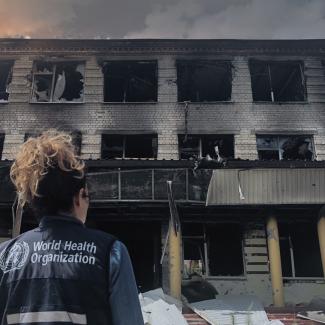Major civic, community, and health organizations are expressing frustration and disappointment after the White House and Food and Drug Administration (FDA) missed an already delayed deadline to finalize a long-awaited ban on menthol cigarettes in the United States.
Regulators in the executive branch have mere weeks to finish the process before the rulemaking window closes for the remaining duration of the Joe Biden administration.
The FDA first proposed the menthol cigarette ban—alongside a similar restriction on flavored cigars—back in April 2022. Cigarettes containing menthol—a minty ingredient—are considered more addictive and harder to quit than regular cigarettes because of how the flavoring and nicotine combine to influence the brain. According to the Campaign for Tobacco-Free Kids, menthol cools and numbs the throat, which masks the harshness of the tobacco smoke and makes it easier for children to pick up the habit.
Both bans have been delayed several times despite considerable public health evidence supporting that restrictions on flavored tobacco could save lives, especially among communities of color. Biden campaigned in 2020 that he would make a "historic effort" to reduce racial inequities in health, but the menthol ban has faced intense pushback from lobbyists for the tobacco industry and groups who say this rule in particular could cause the president to lose Black voters in the upcoming election.
The tobacco industry has been marketing menthol cigarettes for more than 60 years to Black people and other marginalized groups. As the Council on Foreign Relations reported last year, the incidence and mortality from lung cancer is higher among Black Americans than among their white counterparts, and almost 85% of Black smokers use menthol cigarettes, relative to just 30% of white smokers.
Approximately 45,000 Black Americans die from the consequences of tobacco use, according to the Campaign for Tobacco-Free Kids, which also estimates that a ban could save 654,000 lives over the next 40 years.
"We're very disappointed and frustrated. President Biden came in promising to follow the science and the recommendations of his advisors to reduce the prevalence of cancer in this country," Erika Sward, the American Lung Association's national assistant vice president of advocacy, tells Think Global Health.
Officials had originally planned to finish the new rules on menthol cigarettes and flavored cigars by August 2023. Two months later, the FDA sent finalized versions of the bans to White House Office of Management and Budget (OMB) for a review, the final stage in the rulemaking process. Onlookers expected the agency to rubber-stamp the policy by year's end.
But the White House met with tobacco lobbyists in late November, according to STAT News; days later, the FDA pushed the rulemaking deadline to March 2024.
If he does not act on the menthol and flavored cigar rolls, you simply cannot reach the goals that he has for reducing death and disease from cancer
Erika Sward, American Lung Association
"It's deeply troubling that, despite the NAACP, the chorus of medical and public health voices, the majority of the Congressional Black Caucus, and a huge cohort of strong leaders in the Senate that the Biden administration would allow itself to be delayed, let alone swayed by the tobacco companies from this pre-Thanksgiving meeting," Sward says. "If he does not act on the menthol and flavored cigar rolls, you simply cannot reach the goals that he has for reducing death and disease from cancer."
An FDA spokesperson tells Think Global Health that the rules remain under review with the OMB, and that the drug oversight agency "remains committed to issuing the tobacco product standards for menthol in cigarettes and characterizing flavors in cigars as expeditiously as possible."
The spokesperson adds, "at this stage in rulemaking, the FDA is limited from further discussions about the rules before they are published." The FDA did not address questions about why the March deadline was missed.
"In the rulemaking process, this is the final step. It's like being on the one-yard line and trying to do the quarterback sneak, but you keep getting blocked," Emily Holubowich, federal public health advocacy for the American Heart Association, tells Think Global Health. "What makes it disheartening is to know what impact this could have on people's lives."
Whispers about the latest delay triggered 123 national organizations in civil rights, public health, medical, faith, and youth mentoring to place a full-page ad in the Washington Post in March directed toward the Biden administration. In a joint statement, the organizations stated:
"We were deeply disappointed in December when the administration delayed issuing these long-overdue rules. As tobacco use is the leading cause of preventable death in the United States, killing nearly half a million Americans every year, any further delay in issuing the final rules will result in needless disease, suffering, and deaths. The administration must stand up to the tobacco industry and act now to save lives."
The bans on menthol cigarettes and flavored cigars would do more than help Biden fulfill his campaign promise on racial health disparities. They could also support his Cancer Moonshot initiative, which aims to prevent more than 4 million cancer deaths by 2047, in part by strategizing with federal agencies, private companies, and other entities. The Biden administration views smoking cessation as essential to reaching its cancer mortality reduction targets.
"Tobacco companies have disproportionately targeted historically disenfranchised communities," Sward says. "We know that this is a social justice issue because Black, Brown, Native American, and LGBTQ+ communities have been preyed upon with menthol cigarettes. There is only one choice for saving Black lives and protecting public health: to end the sale of these products."
Tobacco companies have disproportionately targeted historically disenfranchised communities
If the Biden administration still intends to finalize the two bans, Sward says it will need to happen before the congressional review window arrives. Under the Congressional Review Act (CRA), lawmakers are allowed 60 working days to overturn rules issued by federal agencies; this policy, in essence, puts a deadline on when an administration can release rules during an election. Congressional watchers expect this CRA deadline to fall on May 22.
If the rules around menthol cigarettes and flavored cigars are finalized and appear in the federal register after the cutoff dates, they could be brought up in the next Congress. If Biden and other Democrats do not win in the upcoming elections, then GOP lawmakers could retroactively strike down the bans using the CRA.
"The White House is very aware of this," Sward says. She and Holubowich recommend that supporters of the rules contact the White House and their members of Congress.
Sward says the American Lung Association will continue to inform the public about the rule and pressure Congress to pass it. Publicly, the organization ran advertisements and coordinated volunteers for public engagement regarding the ban. Behind the scenes, it has been encouraging members of Congress who are for the rule to speak up.
"We will only increase the pressure over the next month to make sure the tobacco industry does not get away with murder in this case," Sward says.


